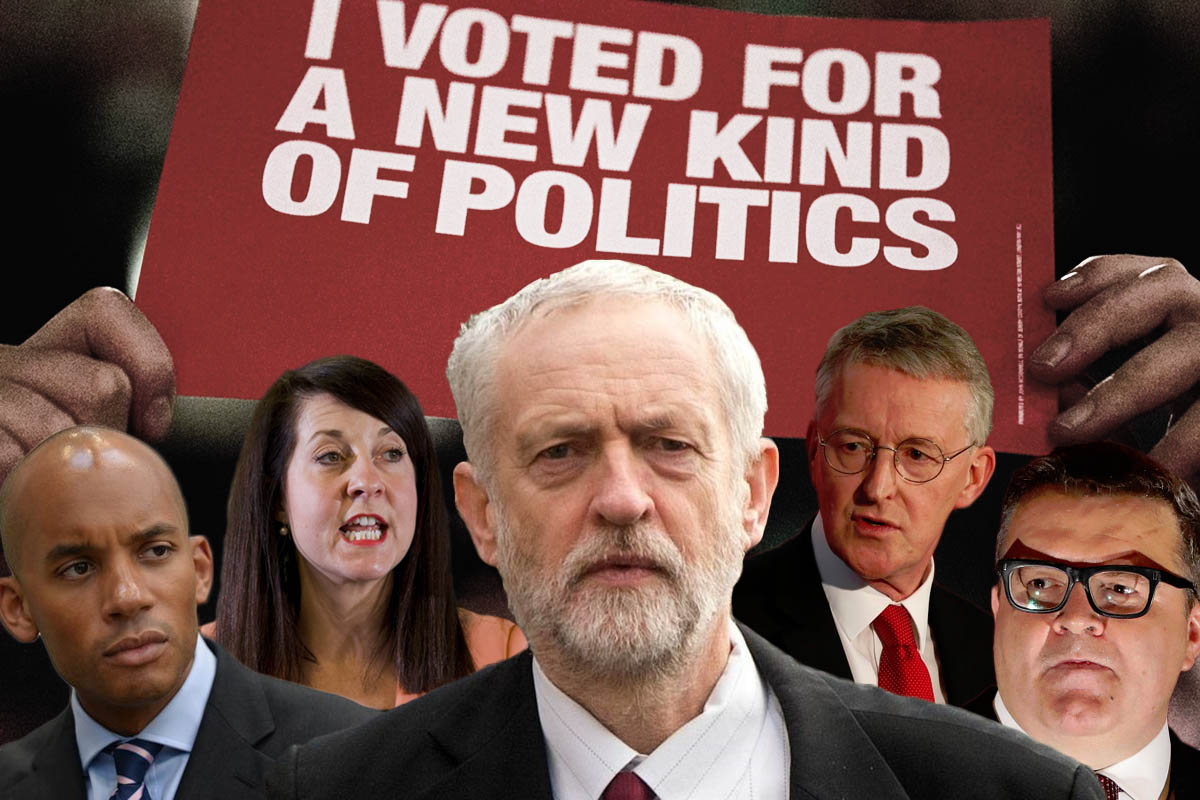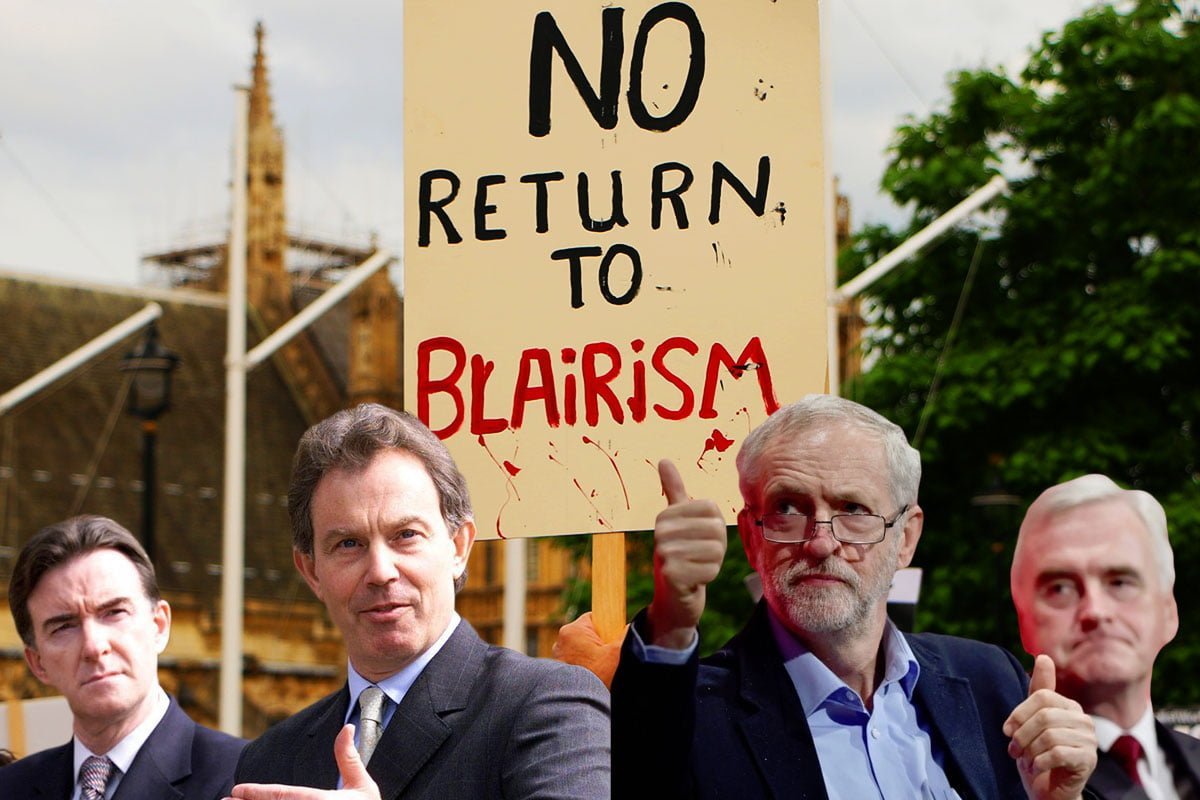This year’s annual Labour conference, held in Brighton, has now ended, with the Left clearly on the rise. One recurring question came up time and again throughout the conference: where are the Blairites? Steve Jones looks at the grim prospects facing Labour’s right wing as the Corbyn movement grows and gains confidence.
One recurring question came up time and again at Labour’s conference in Brighton: where are the Blairites?
The BBC seemed incapable of talking about anything else, so bereft were they at the loss of their friends. One delegate queuing up outside the conference centre shouted out in despair: “My hotel seems full of them”.
In past years, they would have been striding around town in their black expensive suits, now they seemed to be in hiding, so much has the political climate changed.
Of course, whilst they did not wish to show their faces to the delegates, they were happy to send text messages, tweets and comments to the assembled journalists. So they complained about the issue of Brexit not being debated enough – for some reason delegates felt the urge to debate jobs, housing, the Grenfell fire, and other issues not deemed important enough by the right-wing.
They also moaned on about the issue of anti-Semitism, grabbing on to an isolated statement by one fool made at an obscure fringe meeting. Anything to stir the situation up and provide the likes of the London Evening Standard and The Sun with bloodcurdling headlines about a Labour crisis.
Blairites silenced
Most of all, the Blairites moaned on about the agreed organisational changes that make their efforts to undermine Corbyn and to prevent members from reclaiming the party far more tricky.
These rule changes – together with a firm Left majority on the NEC – has put the Blairites in a difficult position. Do they continue to attack Corbyn and risk deselection, knowing that the party machine will no longer be able to provide solid backing for them against the membership in the areas? Or do they keep their heads down and hope nobody will notice them?
An article on the BBC News website provides little comfort:
I recently heard a tale of a Labour MP who made a policy of going to meet new members of his local party; a considerable task since some had quintupled in size. “Why did you join?” he asked one new arrival. “To deselect you,” came the answer.
The decision to conduct a “democratic review” of the party’s internal structures meant that some of the stronger-worded resolutions got remitted, albeit with some reluctance from delegates.
However, delegates were clearly determined to ensure that those at the top of the party understand that clear change and action is needed and cannot be avoided. Even the normally dreary session on the finance report was the subject of some debate. As the Guardian report noted:
The chair of the session, Claudia Webbe, idly asked if anyone had any questions they wanted to ask, clearly expecting the answer to be no. As it happened, they did. The first woman on her feet must have been a trained accountant and went though the report line by line. What was the methodology used to calculate the accruals? And could she have a proper breakdown of the compliance costs? This drew the first ovation of the day. “Quite right,” muttered a man sitting close to me. “We need to know how much they’ve spent on trying to suspend us.” (John Grace, 27/9/17)
Attempts were also made to reference back the standing orders report – a technical device to stop the Conference Arrangements Committee’s usual attempts to hinder delegates from having their way. Constituency party delegates overwhelming supported reference back and gave a loud cheer to the delegate moving reference back over the recent suspension of the local party. However, this was a block vote and union delegations had been ordered to oppose reference back.
For mandatory reselection
 One issue not on the order paper (this year), and possibly not forming part of the forthcoming democratic review, is the burning question of the mandatory reselection of MPs. There is rightly a growing mood that the review must tackle this. Members rightly want to know if their MPs are going to back the Left shift in party policy and, if not, what can be done to ensure that at the next election they can put forward candidates who do.
One issue not on the order paper (this year), and possibly not forming part of the forthcoming democratic review, is the burning question of the mandatory reselection of MPs. There is rightly a growing mood that the review must tackle this. Members rightly want to know if their MPs are going to back the Left shift in party policy and, if not, what can be done to ensure that at the next election they can put forward candidates who do.
This will be where the main fight lies against the right-wing forces inside the Labour movement – against those people who are furious about the loss of control of Labour by the representatives of capitalism.
Just before the conference started, right-wing mouthpiece and secretary of the Blairite faction Labour First, Luke Akehurst, made clear in an article on Labour List that he would be recommending opposition to all reforms intended to give the membership more powers.
Akehurst warned that Blairite organisations – well funded, with their own memberships, structures and staff, we should note – will, “…build a network of local Labour First groups that will provide a positive counterbalance to Momentum’s presence at local level.”
This is a clear warning that the careerist tendency inside the movement, backed by right-wing MPs and party bureaucrats, will continue to organise and use all their resources to try and reverse what has happened over the last period.
Complete Labour’s transformation!
Members must not assume that everybody in the party now backs Corbyn and is happy to see Labour move left. The Blairites and their friends will be acting as a Fifth Column, ready to inflict any damage – short of losing their own seats (of course) – in order to return Labour to the old status quo.
The Labour conference in Brighton was overwhelmingly left-wing, with delegates from the CLPs in particular expressing support for socialist measures. Brighton itself was full of queues of people lining up to attend fringe meetings and discuss politics; one meeting of the Left, called by the LRC (Labour Representation Committee), was so well attended that an overflow meeting was organised in the pathway outside, with around 80 people listening to John McDonnell repeat what he had just said inside.
Akehurst’s call to arms, however, must remind us that the war is yet to be won. But we are the millions against the millionaires. And with this force on our side, we can be victorious in the fight to transform the Labour Party into a vehicle capable of kicking out the Tories and ending austerity.






